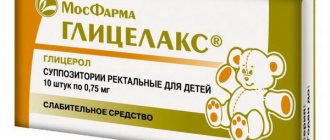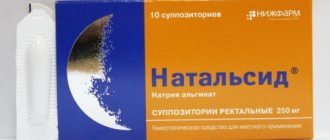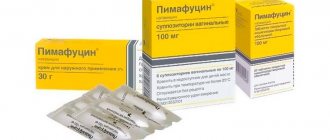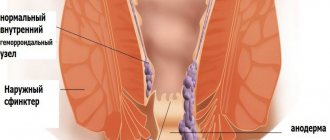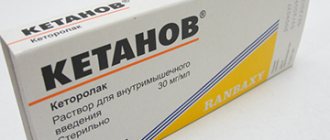Forms of release and composition of the drug Prajisan 200
Prajisan is available in 3 forms:
| View | Description |
| Capsules | They are light yellow in color, containing a white oily suspension inside. They are used internally:
|
| Candles | They are prescribed when there is a threat of miscarriage. Daily dose – 600 mg. |
| Gel | The contents of special disposable applicators are inserted into the vagina. It is important to remember: Prajisan gel contains sorbic acid, a substance that can cause dermatitis. If after using the gel you constantly feel itching, you should stop using this form of medication. |
Pragisan 200 during pregnancy is prescribed for its deficiency.
The main substance of the drug is the hormone progesterone. Other ingredients include peanut butter, glycerol, sorbitol solution, gelatin. Given the form of the drug, the components may be supplemented or changed.
It is important to remember: changing one form of the drug to another is undesirable.
Suppositories for colpitis
Colpitis (vaginitis) is an inflammation of the vaginal mucosa. Colpitis is usually infectious in nature. If the causative agent of the disease is fungi, trichomonas, gonogocci, then they talk about specific colpitis. If the pathogens include streptococci and staphylococci, or the disease is caused by an attack of several microorganisms at once, then colpitis is considered nonspecific.
The selection of the right drug largely depends on the type of pathogen, since only a certain antibacterial drug is most effective against each microbe. For nonspecific colpitis, suppositories with a wide spectrum of action are prescribed (Poliginax, Meratin-Combi, Terzhinan, Hexicon, Betadine). Suppositories with a restorative effect (with sea buckthorn, dexpanthenol) are necessary as an auxiliary element of therapy. Treatment of the disease is carried out not only with the help of suppositories, but also with douching with antiseptic and anti-inflammatory compounds (potassium permanganate, chlorhexidine, sodium bicarbonate, lemon balm, chamomile, sage).
Gardnerellosis and trichomoniasis are types of colpitis, in which the surface of the vagina is populated by gardnerella and trichomonas. For these diseases, suppositories with metronidazole are most often prescribed. Other suppositories may also be prescribed - Macmiror, Hexicon. Treatment for trichomonas colpitis is long-term and lasts at least 3 months, in cycles of 10 days.
Pharmacodynamics and pharmacokinetics
The drug works as follows:
- Gestagen comes into contact with receptors, enters the nucleus and activates DNA there. As a result, rapid RNA production begins.
- The uterine mucosa enters the secretory phase.
- Fertilization occurs.
- Gestagen reduces the excitability and contraction of the uterine muscles.
- When protein lipase is stimulated, fat reserves increase and the rate of glucose excretion increases. Glycogen accumulates in the liver. Aldosterone synthesis increases.
The active substance has different effects on the production of pituitary hormones. It depends on the dose: a small one helps to accelerate, and a large one – suppression. Prajisan 200 is often prescribed during pregnancy. It has pharmacokinetic properties that depend on the form and route of administration.
For example, if capsules are used, the substances they contain will be well absorbed in the gastrointestinal tract: more of the main active substance will penetrate into the blood. It will take approximately 120 minutes for the concentration to reach its maximum. Sometimes the highest concentration can be observed after 1 hour, sometimes after 3 hours. The substance is synthesized in the liver.
The main metabolites detected in blood plasma:
- 20-alphahydroxydelta;
- 4-alphapregnanolone;
- 5-alphadihydroprogesterone.
Metabolic products are excreted in the urine. Otherwise, the absorption and excretion of the drug occurs if it is used vaginally. The product is absorbed quickly. The main substance accumulates in the uterus. The maximum concentration can be achieved 60 minutes after administration. The decrease in the main active ingredient begins after approximately 4 hours.
If the drug is administered vaginally three times a day, 100 mg, the concentration will remain at an average level around the clock.
When progesterone is metabolized in the body, 3-alpha, 5-betapregnanediol are formed. The saturation of the latter in the blood does not increase. Metabolic products are excreted in the urine.
Advantages and disadvantages
Advantages of suppositories:
- ease of use,
- painless when using,
- no negative effect on the gastrointestinal tract (compared to oral medications),
- minimal number of side effects,
- high speed of action.
Suppositories, as a dosage form, have no serious disadvantages. However, since candles have a fat base, when it melts, it can stain underwear.
Suppositories are local drugs. They act exclusively on the source of infection and are therefore most effective. Approximately half of the active substance penetrates local tissues within half an hour after administration of the suppository. After an hour, most of the suppositories dissolve and the active substance completely passes into the blood. When using suppositories, there is no risk of overdose and intoxication of internal organs, unlike systemic drugs. Allergic reactions throughout the body are excluded, and local allergic manifestations are rare.
However, in conditions such as pregnancy and breastfeeding, many suppositories are prescribed with caution.
Indications for use during pregnancy
Prajisan 200 during pregnancy and in its absence is indicated for low progesterone levels.
The hormone progesterone is prescribed to pregnant women who are prone to miscarriage due to:
- pathologies of the endocrine system;
- uterine fibroids;
- problems with the cervix, which cannot hold the fetus in the uterus;
- thrombophlebia;
- antiphospholipid syndrome (APS).
Prajistan is prescribed in the following cases:
| Capsules | Gel |
| Infertility caused by luteal insufficiency | |
|
|
Prajisan has no contraindications during pregnancy, but there is a danger to the child, especially if the birth of a boy is expected in the first half of the entire term. The main substance in the 2nd and 3rd trimesters can contribute to the occurrence of liver diseases.
According to the results of a large number of studies, no cases of abnormal fetal development were found. Nothing is known about the effect the active substance may have on a born baby who is fed breast milk.
Indications
Suppositories are used to treat the following diseases:
- cervical erosion,
- vaginitis,
- vaginal candidiasis (thrush),
- adnexitis,
- endometritis,
- urethritis,
- vulvitis,
- cystitis,
- cervicitis (inflammation of the cervix),
- oophoritis.
Also, suppositories can be prescribed as a prophylactic agent before and after operations on the female genital organs, before and after childbirth, and after abortions.
Contraindications
Prajisan is contraindicated for women:
- having individual intolerance to the substances present in the composition;
- in early pregnancy;
- having problems with the circulatory system;
- suffering from asthma, diabetes.
The drug is also contraindicated if there are:
- vaginal discharge of unknown nature;
- tumors of the reproductive system;
- thrombophlebitis;
- disturbances in the functioning of the liver;
- hypersensitivity to progesterone.
If the drug is taken, the following symptoms may appear:
- allergy;
- contact dermatitis;
- prostration;
- increased drowsiness.
If these or other side effects occur, you should visit a specialist. He will recommend a different form or a different remedy.
Suppositories for endometritis
For endometritis (inflammation of the inner uterine lining - the endometrium), vaginal suppositories are also rarely prescribed. Indeed, with this disease, bleeding is common, as a result of which the active substances are washed out of the vagina. The main treatment includes the use of rectal anti-inflammatory suppositories with diclofenac and indomethacin. They help reduce inflammation and also relieve pain symptoms characteristic of the disease. Vitamins A and E and the immunostimulant Viferon are also prescribed. To prevent the appearance of adhesions, the drug Longidaza is prescribed. The following vaginal suppositories are used:
- Suporon,
- Livarol,
- Polygynax,
- Terrylitin.
Instructions for use, dosage of the drug
The duration of therapy is determined by the doctor, which depends on the patient’s health and her individual characteristics.
In the early stages
Prajisan 200 in capsule form is taken orally during pregnancy. Most often, the daily dose does not exceed 300 mg. The first half of this dose is taken in the morning, and the second in the evening.
The dose may be higher, for example, if the prescription was for luteal phase deficiency, it can reach up to 400 mg. The course of therapy will last 1.5 weeks: it starts on the 17th day of the cycle and ends on the 26th day.
In the later stages
The gel is applied vaginally. The applicator contains 90 mg of the main substance. If it is necessary to cure infertility, the treatment lasts 1.5 weeks and is carried out every day. It usually starts on the 18th, 19th, 20th or 21st day of the cycle. To maintain the luteal phase, use 1 applicator every day. After pregnancy, treatment continues for another 3 months.
The gel is used as follows:
- The applicator is removed, then held so that it is positioned between the thumb and middle finger, and the index finger is placed over the plunger.
- You will need to lie on your back and bend your knees slightly.
- Carefully insert the applicator and press down on the plunger. The contents will end up in the vagina.
- You will need to discard the applicator even if there is gel left in it.
Suppositories for inflammation of the appendages
Inflammation of the uterine appendages (ovaries and fallopian tubes) is called adnexitis, and popularly a “female cold.” With this disease, the use of suppositories alone will not be effective. Usually, in addition to them, antibiotics and systemic anti-inflammatory drugs are prescribed. The course of antibiotics is approximately 7-10 days.
However, with adnexitis, attacks of pain and fever are common. In such cases, treatment can be carried out not only with tablets, but also with suppositories with anti-inflammatory components (diclofenac, indomethacin).
Side effects
Prajisan 200 during pregnancy in various forms can lead to side effects.
If you take capsules, the following symptoms are possible:
- excessive sleepiness;
- dizziness;
- nausea;
- bleeding;
- reduction in the duration of the menstrual cycle;
- tension in the mammary glands.
To eliminate or reduce side effects, you should reduce the dose or use a different type of drug.
If Prajisan is administered vaginally, an allergic reaction such as hives or anaphylactic shock may occur.
Overdose
If the amount of the drug taken exceeds the dose prescribed by the doctor, the following symptoms may be observed:
- increased drowsiness;
- frequent dizziness;
- reduction of the menstrual cycle.
If any of the symptoms are observed, you need to reduce the dose or adjust the regimen.
For example, if:
- frequent dizziness and sleepiness, a dose of 200 ml should be taken before bed in the last 3 days of the 2nd week of the cycle. In this case, the vaginal method is acceptable;
- as a result of an overdose, the duration of menstruation decreases; use should be started a little later: not from the 18th day, but from the 20th. If necessary, symptomatic treatment is carried out.
The drug-savior
Many doctors today prescribe suppositories with indomethacin to pregnant women. Almost always - to relieve increased uterine tone, which threatens miscarriage. However, the direct purpose of the drug is completely different, although quite broad.
Indomethacin has anti-inflammatory, antipyretic, analgesic, and antiplatelet properties. This allows the drug to be used in the treatment of a number of ailments: multiple diseases of the musculoskeletal system, inflammatory diseases of the ENT organs, the genitourinary system, neuritis - this list is long.
Indomethacin has established itself as a highly effective drug that begins to act immediately, so improvement is observed very quickly, doctors say. This is one of the reasons for its widespread use in medicine. And as practice shows, in gynecology as well. Why is indomethacin prescribed to pregnant women?
special instructions
Before taking Prajisan, you should familiarize yourself with its special instructions:
- The product cannot be used as contraception.
- With long-term treatment based on taking the hormone progesterone, you need to undergo regular medical examinations, including liver tests. The appointment must be canceled if deviations in the work of this body are discovered.
- Dosage should be stopped if cholestatic jaundice occurs.
- When taking medications that contain estrogen and progestogen, in some cases patients develop chloasma. In women who are predisposed to developing chloasma, the disease may appear more quickly or worsen when the skin is exposed to ultraviolet rays. Therefore, it is not recommended to frequently stay in the sun, especially in clear weather.
- Patients with depression should be closely monitored. If it develops and enters a severe stage, use should be discontinued.
- Patients with problems with the circulatory and cardiovascular systems should be under the supervision of a specialist.
- Women who drive a car and who operate certain mechanisms by occupation must remember: the active component affects the ability to drive.
Antifungal suppositories
Antifungal gynecological suppositories are prescribed for thrush (fungal vaginitis). This disease is associated with an imbalance in the vaginal microflora, which results in an increase in the number of fungi of the genus Candida. Often, this condition occurs after long-term antibiotic therapy, when the beneficial microflora living on the vaginal mucosa suffers.
The list of active substances used to treat fungus includes many items:
- nystatin,
- sertaconazole,
- miconazole,
- clotrimazole,
- econazole,
- metronidazole,
- Irunin,
- natamycin,
- pimafucin.
These drugs have an effective fungicidal or fungistatic effect, stopping the proliferation of fungi or destroying them.
Suppositories with broad-spectrum drugs, such as nystatin (Poliginax, Terzhinan) are not recommended for use if candidiasis is not complicated by a bacterial infection. Otherwise, complete destruction of the normal vaginal microflora and, as a result, the development of bacterial vaginitis is possible.
In severe forms of candidiasis, antifungal suppositories alone will not be enough, and the doctor will be forced to prescribe systemic antifungal drugs.
Also, antifungal agents (suppositories and tablets) alone are usually not enough to treat thrush. If the normal vaginal microflora, consisting of lactobacilli, is not restored, relapses of the disease are inevitable. To restore microflora, you can use suppositories containing lacto- and bifidobacteria. This:
- Bifidumbacterin,
- Bificol,
- Acylact,
- Vagilact.
These suppositories are used once a day for 10 days.
Drug interactions
Based on the method of application, the medication interacts differently with other drugs. Prajisan 200 during pregnancy with simultaneous use of barbiturates loses its effectiveness. The same applies to taking Prajisan and Carbamazepine, Hydantoin, Rifampicin.
Capsules may enhance the effect of the following substances:
- cyclosporine;
- theophylline;
- troleandomycin.
If Prajisan is used in the form of suppositories or gel, you should not administer other intervaginal agents. This will prevent possible absorption of progesterone.
Analogs
Drugs whose effect is based on the hormone progesterone include:
| A drug | Description |
| Iprozhin | Available in the form of capsules of 100 or 200 mg of the active ingredient. When taken orally, the recommended time is evening, but without connection with food intake. Pregnant women should use it with caution: there is a risk of liver dysfunction. |
| Crinon | Available in vaginal gel form. 1 applicator contains 90 mg of progesterone. Suitable for use in the 1st trimester of pregnancy when the corpus luteum is insufficient. Prohibited for use during deadlines and during feeding. When administering the product, it is important to strictly follow the instructions. |
| Utrozhestan | Available commercially in capsule form. Due to the possible development of cholestasis, the drug is recommended to be used cautiously in the 2nd and 3rd trimesters of pregnancy. It is contraindicated during breastfeeding. The drug is taken orally before bedtime, without connection with food intake. Intravaginal use is recommended together with estrogen preparations. The disadvantages of the product include its high cost in comparison with other analogues. |
| Progestogel | It is a colorless, translucent gel. Active component 1 g per 100 g of total composition. Use during pregnancy has not been sufficiently studied, so its use is only permissible if the benefit to the woman outweighs the risk to the fetus. It belongs to the category of expensive products. |
The best contraceptive suppositories - how to choose?
If a woman does not plan to have children in the near future, the question of which contraceptive suppositories is best to choose for protection becomes relevant. Contraceptive vaginal suppositories are one of the safest methods of preventing unwanted pregnancy, which is suitable for almost every woman, despite the fact that they are chemical methods of contraception.
In addition to safety, vaginal contraceptive suppositories are an easy-to-use and convenient method of protection, as well as an acceptable contraceptive option for occasional use. Therefore, according to statistics, suppositories are most often used by women who do not have regular sex life, which means there is no need to constantly take hormonal pills with a large list of side effects.
Selection of contraceptive suppositories by composition
In medical practice, this kind of contraceptives for women is usually called spermicides. Recently, two types of spermicides according to their composition have reached the greatest demand - suppositories based on benzalkonium chloride or suppositories in which the main substance is nonoxynol. Therefore, such products can be distinguished by the main active ingredient in the composition.
- Suppositories with nonoxynol - after the suppository substances take effect, within 40 seconds they destroy the protective membrane of the sperm, and also in every possible way disrupt its activity and mobility. In addition, such contraceptive drugs have an antiviral effect, to which the pathogens of vaginal syphilis and chlamydia are sensitive. There is also an effect of reducing the sensitivity of the genital organs, due to which sexual intercourse becomes prolonged.
Nonoxynol suppositories - Patentex-Oval and Nonoxynol.
- Suppositories with benzalkonium chloride - after taking effect, such drugs destroy the protective membrane of sperm within 10 seconds, which means 4 times faster than the first version of suppositories. In addition, the components of suppositories destroy protozoan microorganisms (fungi and bacteria), which become provocateurs of infectious diseases. Such drugs belong to the group of surface-active contraceptives that can enhance mucus coagulation, protecting the cervical pharynx.
Contraceptives with banzalkonium chloride are Pharmatex and Erotex suppositories.
Both types of protection against unwanted pregnancy are appropriate during breastfeeding, since their ingredients do not interfere with breast milk and a woman's blood. Also, suppositories have a gentle effect on the mucous membranes of the genital organs, leaving the beneficial microflora of the vagina intact.
Recommendations from leading experts on choosing contraceptive suppositories
Today, the contraceptive market offers a wide range. Moreover, female contraceptives are not so easy to choose due to the large list of companies and types of protection. To do this, leading gynecologists put forward their personal recommendations regarding the choice of vaginal suppositories:
- Nizhpharm Benatex company - suppositories from this manufacturer dissolve easily and quickly, without causing any discomfort during intercourse. The excellent consistency does not allow the product to flow out over time, providing the woman with additional lubrication during sex.
- Erotex company - suppositories from this manufacturer can be compared in principle to intrauterine contraceptives; in addition, they have anti-inflammatory, antiseptic and antibacterial effects. The product is harmless to the vaginal microflora; after a few hours it is gradually removed from the inside with secretions. Candles can also be used by pregnant women, during menstruation or lactation.
- Pharmatex company - suppositories with less popularity, since they cannot be prescribed to all women. The disadvantages of the products are a specific smell, rapid dissolution and leakage, as well as the possibility of allergies to their composition. Experts advise not to use these remedies if you have gynecological ailments.
- Patentex suppositories are contraceptive vaginal suppositories that have excellent reviews from gynecologists. They do not disturb the microflora and act within a few minutes after administration. A broad aspect of the action of the drugs is also noted: prevention of the development of iron deficiency anemia, ovarian endometrium, intestinal oncology, as well as inflammation of the appendages. And, of course, these funds prevent the development of infectious diseases.
Thus, it becomes clear that the leaders among all kinds of topical contraceptives are contraceptive suppositories for women from Nizhpharm Benatex, Erotex, Patentex and Farmatex.
Advantages and disadvantages of such contraceptives
To make the right choice in favor of suppositories to protect against unwanted pregnancy, you need to familiarize yourself with their positive aspects and possible disadvantages. The most important distinctive advantage of this remedy is that you can use suppositories after an unprotected act, but those that give the fastest results are better. Also, for women, such products are the best assistant in the additional production of lubrication, which affects the quality of intimate life.
But such products also have a drawback - long-term use can have a negative impact on the vaginal microflora due to their antiseptic effects. As practice has shown, there are contraceptive suppositories that lead to dysbacteriosis over time. Subsequently, this can threaten the woman with irritation of the mucous membranes, allergic reactions and burning sensation. Suppositories are contraindicated for excessive sensitivity, inflammation and acute and chronic ailments of the entire genitourinary system.
Progesterone levels during pregnancy
Progesterone is produced by the body during menstruation and increases in the middle of the cycle, during ovulation. During pregnancy, its amount constantly increases. The adrenal glands are responsible for producing the hormone.
Progesterone is responsible for the restructuring of the female body before pregnancy.
It affects:
- cell division and growth of fetal tissues;
- enlarged uterus;
- expansion of the pelvic bones;
- enlargement of the mammary glands;
- psycho-emotional state.
Its rate varies depending on the period of pregnancy:
| Trimester | Nmol/l |
| 1st | 8,90-468,5 |
| 2nd | 71,5-303,2 |
| 3rd | 88,7-771,5 |
If fertilization occurred through IVF, the norm should not differ from the indicators during a natural pregnancy, but the woman must keep this indicator under control, because its deficiency is often traced.
When the hormone is higher, this may indicate pathologies of the fetus or diseases of the woman, for example, diabetes, problems with the kidneys or adrenal glands.
If the hormone level is low, there may be a risk of miscarriage.
It could be:
- inflammatory process in a woman;
- delay in fetal development;
- frozen or ectopic pregnancy.
Clinically, progesterone deficiency may not be noticeable, so diagnosing it will require the following examination:
- basal temperature measurements;
- Ultrasound of the genital organs;
- Dopplerography and Doppler ultrasound;
- blood test to determine hormone levels;
- endometrial biopsy.
Only when determining the exact causes of changes in progesterone levels is it permissible to use Prajisan, but only under the supervision of a leading specialist.
In addition to taking it to adjust the hormone level, pregnant women should adhere to a certain diet. To reduce its level, do not consume nuts and dairy products, and reduce protein intake. To increase your intake, include legumes, nuts, avocados, eggs, fatty cheeses and fish and fish oil in your menu.
It is also important:
- maintaining routine and sleep;
- exclusion from food of canned foods rich in vitamins E, C;
- drinking clean water;
- exclusion of hair dyeing;
- maintaining an active lifestyle.
Prajisan is recommended during pregnancy if there is a risk of carrying a child. The product is sold in the form of capsules, suppositories and gel. The active component is the hormone progesterone, which is responsible for reproductive function.
Article design: Vladimir the Great
List of the best suppositories for inflammation in women
When using suppositories, you should remember that all drugs have only their area of application. Therefore, it is impossible to say which suppositories are better and which are worse. It is also necessary to take into account the purpose of various suppositories and their scope of action.
Drugs often used:
- Indomethacin,
- Diclofenac,
- Depantol,
- Hexicon,
- Betadine,
- Polygynax,
- Ovestin,
- Livarol,
- Terzhinan,
- Acylact,
- Miratin-Combi,
- Mikozhinaks,
- Gaynomax,
- Pimafucin,
- Pinafungin,
- Elzhina,
- Ginalgin,
- Fluomizin,
- Neo-Penotran,
- McMiror,
- Klion-D,
- Clotrimazole,
- Ginezol 7,
- Femilex,
- Lactonorm,
- Gynoflor E,
- Vaginorm S.
Vaginal suppositories and tablets
| Name | compound | action |
| Polygynax | nystatin, neomycin, polymyxin B | antifungal, antibacterial |
| Betadine | povidone-iodine | fighting bacterial infection |
| Terzhinan | prednisolone, neomycin, ternidazole, nystatin | antifungal, antibacterial, anti-inflammatory |
| Hexicon | chlorhexidine | antiseptic |
| Elzhina | neomycin, econazole, ornidazole, prednisolone | anti-inflammatory, antifungal, antiprotozoal, antibacterial |
| Ginalgin | metronidazole, chlorquinaldone | bactericidal |
| Fluomizin | dequalinium chloride | bactericidal |
| Neo-Penotran | metronidazole, miconazole | fight against bacteria and fungi |
| McMirror | nystatin, nifuratel | fight against bacteria and fungi |
| Klion-D | metronidazole, miconazole | fight against bacteria and fungi |
| Pimafucin | natamycin | antimycotic |
| Clotrimazole, candide B6 | clotrimazole | antimycotic |
| Livarol | ketoconazole | antimycotic |
| Ginesol 7 | miconazole | antimycotic |
| Acylact, Lactonorm | Lactobacillus acidophilus | probiotic |
| Femilex | lactic acid | fight bacteria |
| Gynoflor E | estriol, lactobacilli acidophilus | probiotic, strengthening |
| Vaginorm | ascorbic acid | regenerative |
| Genferon | taurine, benzocaine, human interferon | increased immunity, pain relief, regeneration of mucous membranes |
| Viferon | human interferon | immunomodulatory |
| Galavit | sodium aminodihydrophthalazinedione | fight inflammation |
| Depanthol | chlorhexidine, dexpanthenol | antiseptic, regenerating |
For which diseases which suppositories are prescribed?
| nonspecific colpitis | general-spectrum antibacterial suppositories (Terzhinan, Polygynax, Meratin-Combi, Mikozhinax, Hexicon, Betadine, Depantol) |
| gardnerellosis | suppositories with metronidazole |
| trichomonas colpitis | suppositories with metronidazole, trinidazole |
| genital herpes | suppositories Genferon, Viferon |
| candidal colpitis (thrush) | at the first stage - suppositories with antimycotic components (miconazole, clotrimazole, nystatin, ketoconazole), at the second - suppositories for restoring the vaginal microflora (Bifidumbacterin, Bifikol, Acylact, Laktozhinal) |
The effect of some substances contained in suppositories
| a drug | action |
| ichthyol | pain relief, tissue restoration |
| indomethacin | fight inflammation |
| methyluracil | fight inflammation, healing |
| sea buckthorn extract | healing |
| extracts of calendula, chamomile | fight inflammation, healing |
| syntomycin | antiseptic |


